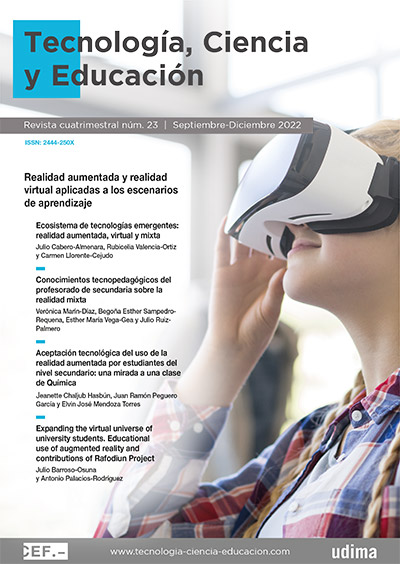Redesign of portals for the Spanish Wikipedia
DOI:
https://doi.org/10.51302/tce.2022.790Keywords:
information literacy, educational cooperation, dissemination of scientific knowledge, informal education, new technologies, society of information, sociology of technology, communication technologyAbstract
The article presents an action-research experience in the Wikipedia encyclopedia in Spanish. It was carried out on the space of portals, which allow the selection and curation of content and the creation of thematic tours. For this, a diagnosis was made of its current state and collaborative instances were generated from wiki technology. Based on a situation defined by the decline in participation, the actions aimed at reactivating the spaces, updating the infrastructure and content, improving access from devices and facilitating its joint presentation.
The interventions were carried out by an interdisciplinary team of university teachers and students (men and women) during 2020-2021, in collaboration with volunteer editors. As a result, about 120 portals were redesigned. The results show some potential of Wikipedia as an open educational resource (OER). Along with this, it reflects on the challenges of collaborative production among peers in sociotechnical environments. The methodology complements the analysis of records and data available on the platform, along with the systematization of experience.
Downloads
References
Aimar, L., Pagola, L. I. y Zanotti, A. (2021). Editatones para el abordaje de sesgos en Wikipedia en español. Análisis de tres experiencias de edición colectiva y simultánea sobre la enciclopedia libre. Virtualidad, Educación y Ciencia, 22(12), 66-83.
Alexa. (2022). The Top 500 Sites on the Web. https://perma.cc/8WAP-NTCA
Benkler, Y. (2006). The wealth of Networks: How Social Production Transforms Markets and Freedom. Yale University Press.
Benkler, Y., Shaw, A. y Hill, B. M. (2015). Peer production: a form of collective intelligence. En T. Malone y M. Bernstein, Handbook of Collective Intelligence. MIT Press.
Butcher, N., Kanwar, A. y Uvalic-Trumbic, S. (2015). Guía básica de recursos educativos abiertos. UNESCO.
Crees, U., Moskaliuk, J. y Jeong, H. (Eds.). (2016). Mass Collaboration and Education. Springer.
Di Lauro, F. y Johinke, R. (2017). Employing Wikipedia for good not evil: innovative approaches to collaborative writing assessment. Assessment & Evaluation in Higher Education, 42(3), 478-491.
Dussel, I. (2020). La clase en pantuflas. Conversatorio virtual con Inés Dussel. https://bit.ly/35t28vS
Fals Borda, O. (1990). El problema de cómo investigar la realidad para transformarla. Tercer Mundo Editores.
Ford, H. (2015). Fact Factories: Wikipedia and the Power to Represent (Disertación doctoral, Universidad de Oxford).
Ford, H. (2020). Rise of the underdog. En J. Reagle y J. Koerner (Eds.), Wikipedia @ 20. MIT Press.
Keegan, B. (2020). An encyclopedia with breaking news. En J. Reagle y J. Koerner (Eds.), Wikipedia @ 20. MIT Press.
Konieczny, P. (2016). Teaching with Wikipedia in a 21st-century classroom: perceptions of Wikipedia and its educational benefits. Journal of the Association for Information Science and Technology, 67(7), 1.523-1.534.
Lerga Felip, M. y Aibar Puentes, E. (2015). Guía de buenas prácticas para el uso docente de Wikipedia en la universidad. Universitat Oberta de Catalunya.
Massviews Analysis. (2021). Wikimedia Toolforge. https://bit.ly/3tuBcE5
Meta-Wiki. (2022). Programs & Events Dashboard. https://bit.ly/3KpV1TT
OBS. (2013). Descubre el Agile Project Management.
OCDE. (2007). On the Sustainability of Open Educational Resource Initiatives in Higher Education. Centre for Educational Research and Innovation (CERI).
Pagola L. y Zanotti, A. (2019). Discusiones en torno a la definición de abierto en los recursos educativos abiertos (Acta de congreso). Workshop sobre Prácticas Educativas Abiertas. San Luis, Argentina.
Pereira, L. (2016). Sistematización etnográfica: una propuesta para la evaluación de experiencias de desarrollo comunitario. Fondo Editorial UNERMB.
Tramullas, J. (2016). Competencias informacionales básicas y uso de Wikipedia en entornos educativos. Revista Gestión de la Innovación en Educación Superior, 1(1), 73-88.
Uría, I. (2016). Entrevista a Jimmy Wales, fundador de Wikipedia. Nuestro Tiempo, 690, 6-17.
Van Dijck, J. (2016). La cultura de la conectividad: una historia crítica de las redes sociales. Siglo Veintiuno.
Wikimedia. (2021a). Estadísticas de Wikimedia. https://bit.ly/3CfQUqs
Wikimedia. (2021b). Programa de educación de Wikipedia. https://bit.ly/3MnVasF
Wikipedia. (2015). Wikipedia: qué es un portal destacado. https://es.wikipedia.org/wiki/Wikipedia:Qu%C3%A9_es_un_portal_destacado
Wikipedia. (2017). Categoría: Wikipedia: portales estándar. https://bit.ly/3IM6lJu
Wikipedia. (2019). Wikipedia: historia de la portada. https://es.wikipedia.org/wiki/Wikipedia:Historia_de_la_portada
Wikipedia. (2020a). Categoría: Wikipedia: portales con extractos. https://bit.ly/3pEscep
Wikipedia. (2020b). Plantilla: base de portal. https://bit.ly/3ILrjs1
Wikipedia. (2020c). Plantilla: base de portal/zona de pruebas. https://es.wikipedia.org/wiki/Plantilla:Base_de_portal/zona_de_pruebas
Wikipedia. (2020d). Wikipedia: encuestas/2019/sobre una política de portales. https://bit.ly/36RRSO6
Wikipedia. (2021a). Ayuda: espacio de nombres. https://es.wikipedia.org/wiki/Ayuda:Espacio_de_nombres
Wikipedia. (2021b). Wikipedia: derechos de autor. https://es.wikipedia.org/wiki/Wikipedia:Derechos_de_autor
Wikipedia. (2021c). Wikipedia: wikiproyectos. https://es.wikipedia.org/wiki/Wikipedia:Wikiproyectos
Wikipedia. (2022a). Plantilla: extracto. https://es.wikipedia.org/wiki/Plantilla:Extracto
Wikipedia. (2022b). Portal: portada. https://es.wikipedia.org/wiki/Portal:Portada
Wikipedia. (2022c). Wikipedia en español. https://es.wikipedia.org/wiki/Wikipedia_en_espa%C3%B1ol
Wikipedia. (2022d). Wikiproyecto: portales. https://es.wikipedia.org/wiki/Wikiproyecto:Portales
Zanotti, A. (2021). Wikimedia y la cobertura del COVID-19 en español. Producción colaborativa de conocimientos en temas de actualidad. Área Abierta, 21(2), 271-287.
Zanotti, A. y Magallanes Udovicich, M. L. (2019). Wikipedia y ciencias sociales: acceso libre al conocimiento en campos especializados. PAAKAT: Revista de Tecnología y Sociedad, 9(16), 6-16.
Downloads
Published
How to Cite
Issue
Section
License
Copyright (c) 2022 Agustín Zanotti Gordillo

This work is licensed under a Creative Commons Attribution-NonCommercial-NoDerivatives 4.0 International License.


























